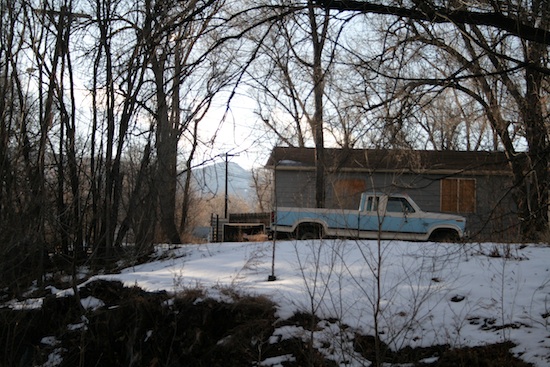Tessa Cheek
Postcards from the West
ISSUE 12 | HOME AND PAIN | JAN 2012
I grew up in downtown Colorado Springs, a city that, despite its half-million occupants, doesn’t have much of a downtown at all. By plane you can’t even pick it out except to note a patch where the streets are gridded. The rest of the city pours out in curling lanes and puddled cul-de-sacs, proliferates across dusty plains and foothills like 200 square miles of mushrooms at the roots of the Rockies. We have what is called a “boom and bust” economy, and some of our January blizzards vanish in three days of hyperbolic 70-degree weather. It is unfair, but probably not inaccurate, to say that our local economy is hyper-responsive to trends. In the ’90s, Oracle and Microsoft mid-rises popped up all over the northern half of city and people built fabulous McMansions all across the plains and massive houses right into the sides of the mountains—some of them even built around the land and sported pre-existing boulders as living room walls or chiseled out fireplaces. Then a new kind of cold set in, and brand-new tribes of homeless programmers gusted across the parks and howled in the underpasses, speaking in desolate code. Likewise, America’s various crusades have served us well: Colorado Springs houses not one but three military bases and is home base to evangelical mega-institutions like New Life Church and Focus on the Family. Much of our population overturns like new skin every three years, is born again. Meanwhile, America’s easternmost 14,000 footer, Pike’s Peak, looms close, its residency interminable. Its face smolders red in the morning, turns sullen purple at night and blazes white under a close, clear midday sun. We watch it, tell north from south by it, and in turn, it watches us.
As a witness, the Peak has seen a lot from us. Sometimes we are rich, sometimes poor, sometimes sad, sometimes happy; some of us are beaming in a kind of ecclesiastical bliss and some of us are taking prescribed bong rips. Ours may or may not be one of America’s moodier cities, but its proximity to the mountains does seem to make us unusually self-conscious of our swings. And like any bunch of people living together, those swings impact everyone. In the spring of 2009, my closest childhood friend, Whitney, died in a fire. She was at a 7-11 on Colorado Avenue. She was filling the tank of her mother’s blue Honda Odyssey to drive into the mountains. A woman with a husband on a military tour tried to cut a red light and drove too fast through the parking lot: she hit a pick-up and the pick-up hit a gas pump. A veteran by the name of Allen Pitts told the papers that it reminded him of Iraq. But it was an accident. It was a chain reaction and I’ve tried to follow the links back, past 7-11’s faulty barricades, past the red light, past a woman’s longing for her husband and our nation’s dependency on fossil fuels. I’ve linked one cool metal circumstance to another looking for their anchor in some kind of fault. But the truth is the links go nowhere, or everywhere. They get weaker and weaker until they are as thin and terrible and lovely as a necklace you can’t ever take off and even if you don’t hang a cross on it, the symbol of a kind of faith, the picture of a non-rational belief settles over everything. It’s been almost three years. I still go to the college we both attended and admit to thinking about coming home as a kind of pilgrimage, an odyssey to a place made sacred by hurt. Wherever the chain leads, it isn’t to her. And maybe that’s because she’s right around here, and maybe that’s why I can’t stop writing to her about the place she has become.
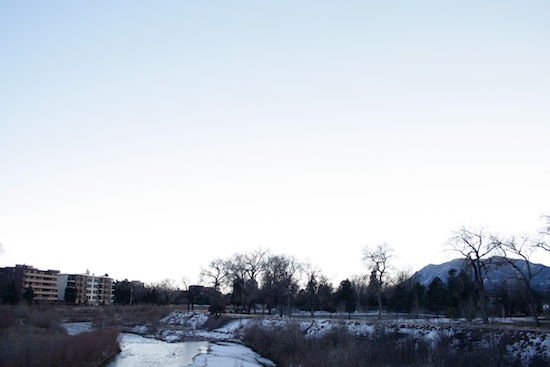
Everyone knows giants developed the West. They had doublewide, meaty pink hands, they had ten gallon hats for heads, they had silver-toed boots for feet, they had leather pretty much everywhere on the outside and inside they were full of pebbles. This, because they chewed granite the way their emaciated devotees would later chew ice. They measured roughly 14,000 feet from hip to hip. They were inveterate gamblers and very vain. They found themselves a massive table west of downy Kansas. They went a few rounds with the time-space dice. They became overly giddy, some might say high, certainly dizzy. A fellow by the name of Pike took a nap, spooning the much-too-young Cheyenne right on the table. It was inappropriate, even lewd. They left the dice mid-game, all the many pieces sprawling out from their bellybuttons and some of them still spinning.
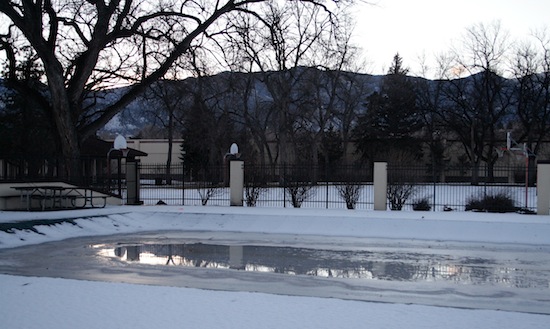
As far as I know, Colorado Springs has always been divided by our comings and goings. In 1871, a Civil War general by the name of Palmer conceived our dry town as the first “destination” on the Denver & Rio Grande Railway. It was a stop worth making on the way west by virtue of its beauty and a four-star hotel. The message didn’t take long to steam down the long metal spine—Something like a bruise on the body of the west! A new place to pool! So we ached to be here from the start. We hover close to our tributaries, and most of us can’t stay long.
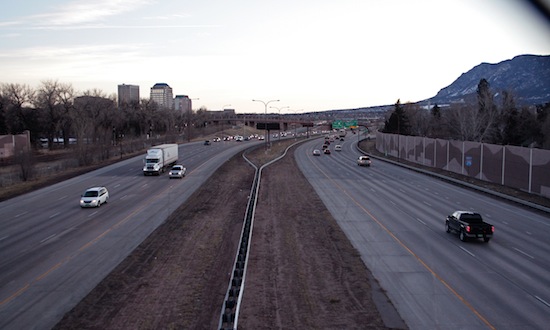
The rails have mostly cooled. Time has ironed them out. For all modern intents and purposes, we have an interstate: an I un-aging, like an awkward Peter Pan, always, always 25. Or maybe it’s the exact distance of the Rockies: an aunt’s arm’s length to a blue-blushing face. She says, let me get a good look at you! and My, but you haven’t grown at all! You’re as tall as ever! You make this old lady feel so…
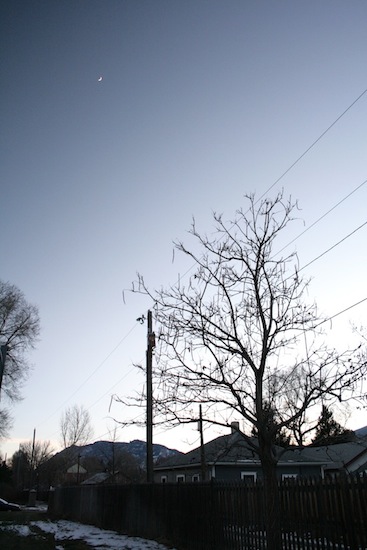
What I mean to say is, people who grow up looking at mountains lodge their nostalgia where it matters: in each cornea and beneath each fingernail, in the four dry sockets where wise bones used to be. It’s anticipatory, don’t let anyone tell you it’s not aesthetic. I could spend longer than forever wondering if it’s a dogma I share even with those I blatantly disagree with; wondering if it has made a fundamentalist of me. Anticipatory Nostalgia is the thing we mistake for beauty, over and over again, the bottoms dropping out of our stomachs and our hearts flipping every time. It might be cruel, even silly—it is certainly lovely—that we should be so forgetful.
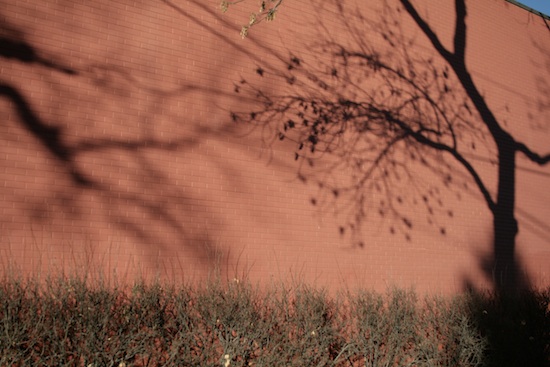
Ceaselessly scrutinized by sleepy giants, those immovable mountains, our own little ways of being are tempestuous at best. We try to be far-reaching. Some founding fathers even wrote a code for it— tax breaks for non-polluting industries. We did it for our giants, they whispered to the highway, we don’t want to shave their lovely flanks for cheap red gravel. We care. War, a nonpolluting industry, came first— setting up shop at Colorado Springs’ northern and southern poles, flanking the highway east and west, flying and walking out, respectively. Our fathers even hollowed out the ribcage of Cheyenne Mountain in order to smuggle in a new, state of the art heartbeat— the comings and goings of missiles. That was in the ‘50s.
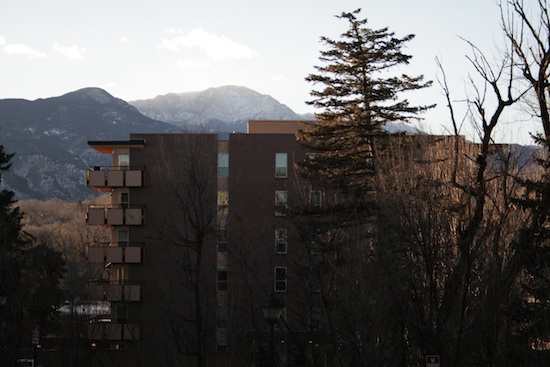
My father used to say, before he moved away, that our founders forgot to account for spiritual pollution. Like everyone before them, the pilgrims who started moving out here in the ‘90s came looking for a New Life. Only this time they hailed from further west instead of back east, journeyed from an Orange County to a red one. I do not know if they feel at home here. It seems like their nostalgia for what comes after life makes for bizarre rules in this one. Still, we have things in common: we focus on our families and we suffer their loss. They don’t approve of my family, but they keep telling me to focus on it.
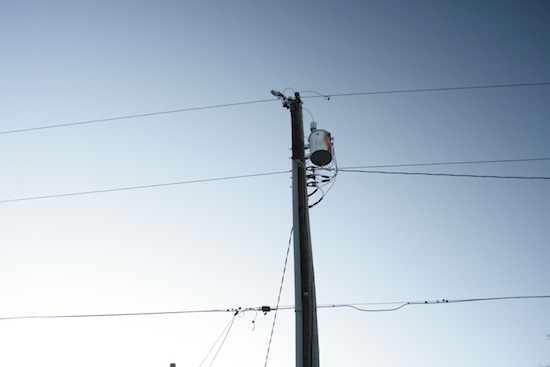
You used to joke you were my sister from another mister and I thought about that the whole time while I walked from my childhood home, a bungalow on the east side of the city, to yours, a sprawling green Victorian, on the west. I crossed two creeks and a set of railroad tracks used to move coal. I crossed the highway. It was dark by the time I got to your house. Everyone said your family was out of state for the holidays, but the light was on in yours, the emptiest room. I walked by very quickly and two blocks later I couldn’t stop myself from taking a picture of a man through his living room window.
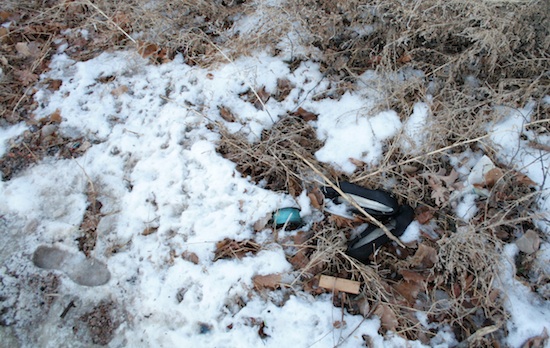
When we were fifteen my mom helped you sew a black satin dress. It was harder than anyone thought it would be. You had found a dress form but it said nothing of your fragile lines and was still too small, even for you. The way I remember it, the project strolled along through design and fabric selection. Nothing happened for several weeks and the whole enterprise finally huddled into one tense night. I hovered in the front of the house listening for my mom’s occasional GOD DAMMITS and your murmured frustrations, which were always tinged with regret.
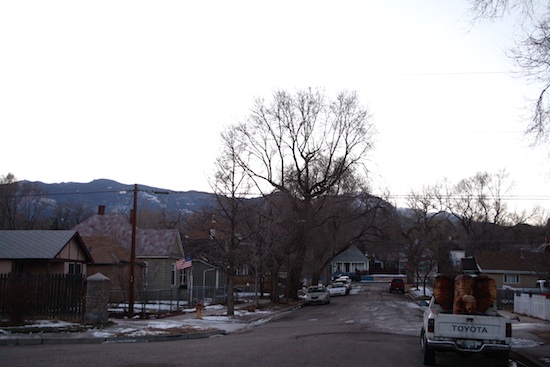
On the west side the streets are steeper. Despite that, we were convinced we could learn to skateboard on them. I still have it—a knotted white scar like a blank pearl on the front of my ankle. I slid all over the road on my first try and ground up the meat of my joints on tarry gravel. Like an older sister, you kept your voice low, lead me up to the teal bathroom on the second floor and sat me on the ledge of your claw-foot tub. You knelt there and harvested stones. The smallest, the deepest set, you plucked with your mom’s tweezers. I was struck dumb with pain, mostly in awe of your generosity.
